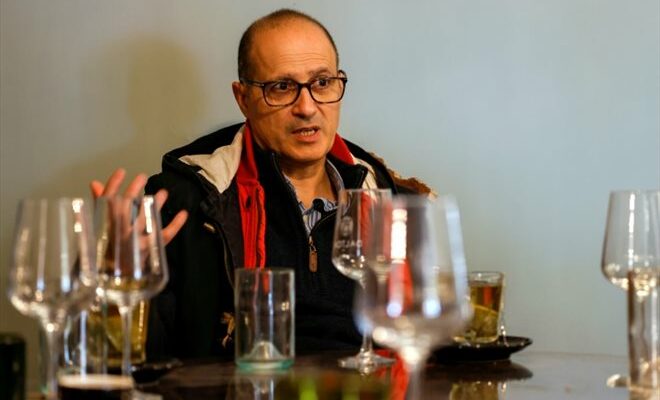The Lebanese village of Maroun El Ras seen from the agricultural hamlet of Dalton, northern Israel, January 29, 2024 (AFP/jalaa marey)
In northern Israel, black clouds rise above the vineyards which extend to the Lebanese border where there are daily exchanges of fire between Hezbollah and the Israeli army.
For the region’s winegrowers, time is running out. The vines must be pruned before spring, “otherwise the year is ruined,” explains Alex Haruni, owner of Dalton Winery.
He fears that the outbreak of a wider conflict between Israel and the Lebanese Islamist movement Hezbollah could jeopardize his harvest.
The war against Hamas in the Gaza Strip, which erupted on October 7, has presented Israel’s wine industry with numerous challenges, including a labor shortage and falling demand.
These difficulties come on top of a year 2023 marked by a meager harvest due to exceptional heat.
Hezbollah regularly claims to target Israeli army positions on the border, in support of the Palestinians in Gaza. Israel responds by bombing targets in southern Lebanon.
In nearly four months, more than 200 people, mostly fighters, have been killed in southern Lebanon according to an AFP count.

The vines of the Israeli agricultural hamlet of Dalton, near the Lebanese border, January 29, 2024 (AFP/jalaa marey)
On Sunday, Defense Minister Yoav Gallant said he had ordered the Israeli Air Force to “point the noses of the planes towards the north and prepare for any eventuality.”
The last war between Israel and Hezbollah dates back to 2006.
A hail of rockets rained down on northern Israel that summer, but a ceasefire was reached in time for wine growers to harvest their grapes.
– Labor shortage –
Rami Na’aman, owner of an eponymous winery in Ramot Naftali, an Israeli village near the Lebanese border, was forced to leave the area like thousands of other residents of the north of the country.

Bottles of wine from the Dalton Winery in northern Israel, near the Lebanese border, January 29, 2024 (AFP/jalaa marey)
He can only go to his establishment twice a week, when the army does not close the roads.
Migal, an Israeli research institute, published a survey of 389 farmers in November, 76% of whom predicted an “average 35% drop in production and income.”
The agricultural sector is facing “the greatest labor crisis since the creation of the state” of Israel in 1948, the Ministry of Agriculture warned recently.
Thousands of foreign workers have fled the country since the start of the war, Israeli agricultural workers have been drafted into the army as reservists, and the government has barred entry to tens of thousands of Palestinian workers from the West Bank. occupied and besieged Gaza Strip.
Eyal Miles grows vines and cherries around Kerem Ben Zimra, an agricultural hamlet that is home to four wine farms just six kilometers from Lebanon.
Mr. Miles also fears he will not be able to prune his vines by spring.

Eyal Miles grows vines and cherries around the agricultural hamlet of Kerem Ben Zimra, in northern Israel, near the Lebanese border, January 29, 2024 (AFP/jalaa marey)
The workers he usually hires on his 7 hectares are “afraid to work here because of the proximity to the border,” he said.
At the Dalton Winery, a Hezbollah shell damaged the vines on a plot near the border, forcing workers to wear bulletproof vests and helmets ever since.
Around 10% of its vines are located in closed and inaccessible military zones and winegrowers are also deprived of tourist visits, which represented a significant part of their income.
– Demand down –
Mr. Miles explains that most of his sales came from visitors to the premises, but “since October 7, the cellar has been closed”, and online sales cannot cover the shortfall.

Alex Haruni, owner of the Dalton Winery, near the border with Lebanon, during an interview with AFP, January 29, 2024 in Israel (AFP/jalaa marey)
And wine growers also have to face a drop in demand.
The war “clearly caused a decline in wine consumption,” said Haim Gan, a wine expert and founder of The Grape Man, a wine tasting store.
According to him, the call-up of more than 300,000 reservists, the postponement of weddings and other celebrations, as well as the “gloomy atmosphere” of the war are probably the cause.
At Dalton Winery, Alex Haruni does not rule out layoffs.
However, he remains optimistic. “We will overcome this situation” despite the threat of war. By the end of March, “everything will be pruned and everything will be ready for the next harvest.”
© 2024 AFP
Did you like this article ? Share it with your friends using the buttons below.




